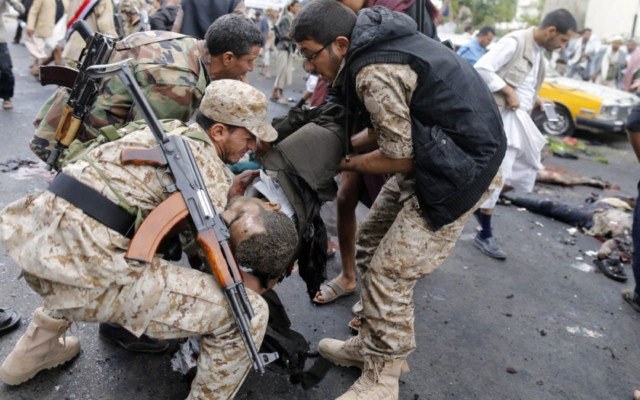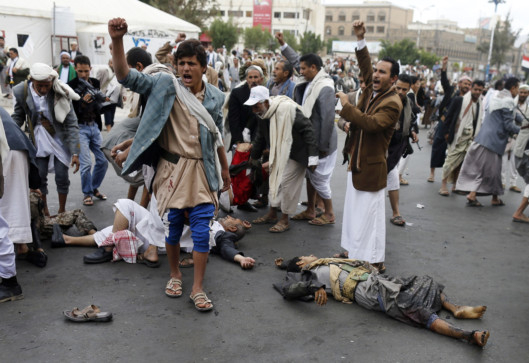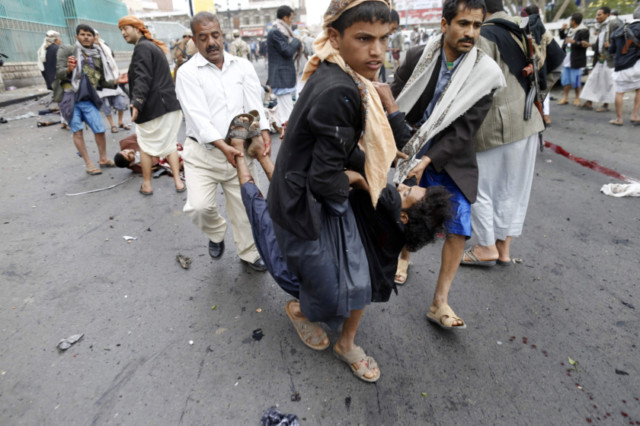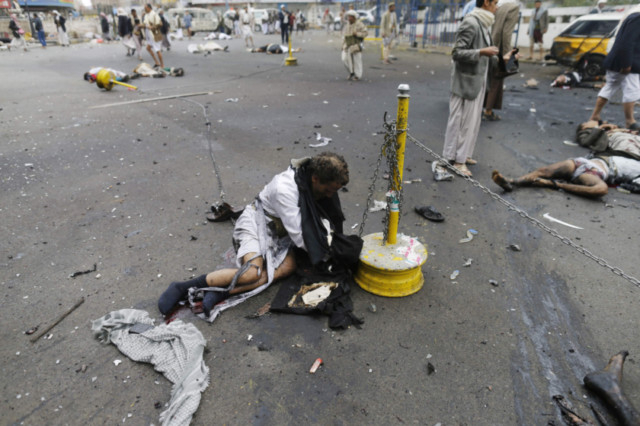
Sana’a: At least 43 people were killed when a powerful blast ripped through the Yemeni capital in a suicide bomb attack on Thursday, plunging the violence-plagued state into further turmoil after weeks of political deadlock.
Dozens more were wounded in the attack in Sana’a’s Al Tahrir square, which was aimed at a gathering of supporters of Al Houthi rebels who overran the capital last month.
A separate suicide attack killed 20 Yemeni soldiers in the country’s southeast in a car bombing suspected of having been carried out by Al Qaida, a military source said.
Yemen has been wracked by political turmoil and sporadic violence since the 2012 toppling of strongman Ali Abdullah Saleh, with rebels and militants battling to exploit a power vacuum and seize control of territory.
The bombing in Sana’a came a day after Yemen’s new prime minister designate, named as part of a UN-brokered peace deal, refused the post amid fierce rebel opposition.
Witnesses said a suicide bomber detonated an explosive belt at a checkpoint at the entrance to the protest gathering, adding that steel balls were seen strewn at the scene of the blast.
An AFP photographer saw the lifeless bodies of four children among the victims.
Medics at the nearby Police Hospital issued an urgent plea for more doctors to deal with the number of casualties.
Supporters of the rebels gathered after the blast - the largest in Sana’a since May 2012 - demanding the exit of beleaguered President Abd Rabbo Mansour Hadi.
The Al Houthis, who are also referred to as Ansarullah, swept into the capital on September 21 after fierce battles with forces allied to the government in Sana’a that left more than 270 dead.
A UN-brokered peace accord, which called for a rebel withdrawal from Sana’a and the naming of a neutral premier, was struck the same day. But the Al Houthis have dug their heels in, refusing to support Hadi’s choice for prime minister and demanding a greater role in decision making as well as political and economic reform.
In addition to the Al Houthis swooping south from their Saada stronghold in the north, the authorities have also had to deal with southern secessionist aspirations and a bloody campaign by the country’s Al Qaida franchise.
The 20 soldiers were killed on Thursday when a suspected Al Qaida operative detonated his explosives-laden car at an army post on the western outskirts of the southern city of Mukalla, a military official said.
A tank and two army vehicles were destroyed in the blast, the official added.
On Wednesday, suspected Al Qaida militants launched a wave of dawn attacks on police and the army in another central town, killing 10 policemen.
Yemen remains in political deadlock after Hadi infuriated the rebels in Sana’a earlier this week by naming his chief of staff, Ahmad Awad Bin Mubarak, as prime minister as part of the UN’s reconciliation accord.
Under Al Houthi pressure, Hadi accepted Bin Mubarak’s “request to be relieved” of forming a new government, Saba state news agency said.
Bin Mubarak took his decision “in a bid to preserve the national unity and protect the country from divisions,” Saba said citing a letter sent by the PM-designate to Hadi.
In a statement on Wednesday, the rebels said Bin Mubarak’s appointment had been “against the will of the nation” and “at the behest of outside forces,” an apparent reference to US and Saudi influence.
Rebel leader Abdul Malek Al Houthi had reportedly called late on Wednesday for protests in Sana’a against the appointment.
Since storming into Sana’a, the Al Houthis have been tightening their grip on the city while also looking to expand their control eastwards to oilfields and to the strategic southwestern strait of Bab Al Mandab.
Foes of the Al Houthi rebels - who hail from the minority Zaidi community - accuse them of taking orders from Iran and groups behind the 2011 uprising, which ousted Saleh have protested their presence in Sana’a.
Al Tahrir, or “Freedom” square, where Thursday’s blast hit Al Houthi supporters, was the crucible of the rebellion that ended decades of authoritarian rule.















